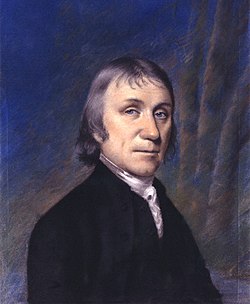British chemist and clergyman, chemistry of gases pioneer

Joseph Priestley (1733-1804), English clergyman and chemist, one of the discoverers of oxygen, was born on March 13, 1733, in Fieldhead, Leeds. He spent four years at a dissenting academy in Daventry and later became a minister at Needham Market.
Priestley wrote The Scripture Doctrine of Remission, Letters to a Philosophical Unbeliever, and his controversial History of Early Opinions Concerning Jesus Christ (1786.) In 1761, he became a teacher at Warrington Academy. It was during his visits to London that he met Benjamin Franklin who supplied him with books for his History of Electricity published in 1767.
The same year, he became minister of a chapel at Mill Hill, Leeds, at the same time studying chemistry. Priestley also became a minister of other churches. He moved to the USA in 1794 and was well-received there.
Oxygen Discoveries
For his work of oxygen, he was known for his Priestley oxygen discovery along with Antoine Lavoisier. Priestley had noticed that if an electric spark is sent through a mixture of air and hydrogen (that time simply called "inflammable flame"), there was an explosion, and then moisture (he called "dew") left behind. Priestley argued that this dew was pure water.
Joseph Priestley was a pioneer in the chemistry of gases, also one of the discoverers of oxygen. He died in Pennsylvania.
Resources:
Biographical Dictionary, edited by Una McGovern, Chambers (2002)
Moore, Pete. E=MC2: The Great Ideas That Shaped Our World. London: Quintet Publishing, 2002
Image Credit:
Joseph Priestley, by Ellen Sharples (1794), Wiki Commons. Retrieved March 13, 2012
(c) 2016. Tel Asiado. Written for InspsiredPenWeb.com. All rights reserved.

No comments:
Post a Comment